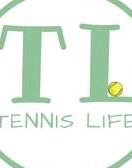There are all kinds of weapons in tennis, and not all of them are actual strokes. One weapon is specific to doubles (and mixed doubles) tennis, and though it's a bit more abstract, it's just as important. I'm referring to "communication." Communication in doubles is vital. It's absolutely necessary... and it's not used nearly as much as it should, especially among lower level league players. The communication between those doubles teams mainly consists of determining who serves first and who plays on which side. But communication should go much further than just that, and the more it's utilized, the more of an advantage you give your team. Communication can be separated into verbal and non-verbal, but for this post, I'm going to focus on just the verbal element, specifically, the communication during points, in-between points, and those random other times we use it.
Communication During Points
Communication during points is most often used in order to work out who will take the ball. We hear things like "yours" and "mine" often while playing points. Honestly, I feel that in a game as fast as tennis that yours and mine are far too long to use. Instead, "you" and "me" are better alternatives. It may seem insignificant, but in a point, a fraction of a second can mean hitting the ball early or hitting it late. If your team is not doing this, then you should consider adding it to your game. it should be considered to add to your game.
Aside from who is going to take the ball, you can also use verbal communication to tell your partner where you are moving to or where you would like them to move. Here, we most commonly use the words "up" and "back." These words are just as important as "you" and "me" because if both players are in their appropriate positions, you are far more likely to win the point. In doubles tennis, it's not uncommon for players to play the baseline for more shots than they should, and if one realizes their opponents is struggling defensively, they should communicate this to their partner by saying "up." Likewise, if one player recognizes that their situation has turned from offensive to defensive, they should communicate this to their partner by saying "back" as soon as possible. During points, the fractions of a second that you save by communicating with your partner pay off in dividends with quicker reactions, better shots and better positioning.
Communication in-between points is just as important as communication during the point. In-between points, there are- a few things that a team should be talking about and considering. A few of the most important are:
- If serving, where it will be aimed (out wide, down T, at body, etc...)
- Is the net player going to poach on the serve
- What has happened in the match (set, game) so far
- What should be done in reaction to this
- What is our fallback if our opponents respond to our reaction
Communication In-Between Points
Success in tennis depends a great deal on not overthinking things and playing the points from your gut, but that is only during the point. Communication in-between points (games, sets) is vital. In-between points is the time to work out strategies and tactics, which will not only help you predict your opponent's response but also help you plan your reaction. For example, if you knew ahead of time that your partner was serving down the T, you would also know that the return would most likely come back up the middle and that you should be ready to poach for the putaway. Talking to your partner helps the team play smarter, and playing smarter means the other team has to work harder.
Communication For Other Reasons
Finally, there are times to use communication not just for the sake of communication, but for other reasons. There will be moments when your opponents are killing it, like everything they do is a winner for them. It's in moments like this that you should come together, not just to work out strategies, but additionally to try to break the rhythm of your opponents. If you do not communicate with your partner now and just go with the flow, you will more likely get beaten - and beaten very quickly.
Communication can also be used to allow your partner or yourself to grab a quick breather. Have you ever been in a game that seemed to go 10 deuces long? Have you ever been in a game where you had a point go on and on for around 30 strokes? Times like this are a good time to come together and use communication to grab a quick breather. As a good partner, it's your responsibility to know when your teammate needs that break, even if they don't want to take it.
Lastly, communication is essential to help uplift your partner. Regardless if your teammate has missed seven consecutive shots or has double-faulted an entire game away, staying positive and keeping your partner focused on the task at hand is something every good partner must do.
Communication separates veteran doubles players from the newbies. And no matter if you are in the former group, the latter group, or somewhere in the middle - if you are not communicating with each other, you are not playing your best tennis. Using communication effectively is just as important as a having a huge serve or a great volley and must be practiced just as much if not more.
SUBSCRIBE TO OUR AWESOMENESS
and never miss a post, announcement or giveaway!

Tennis Life Magazine was created by tennis players, for tennis players, offering everything a recreational players needs to perform and feel their best, both on and off the courts: tennis tips, tennis-specific workouts, tennis gear and fashion reviews, health and wellness tips, healthy recipes for athletes, motivation, tennis news, and more!

